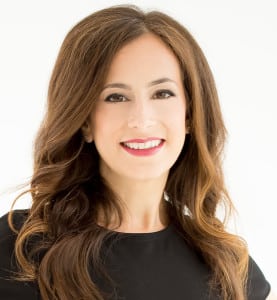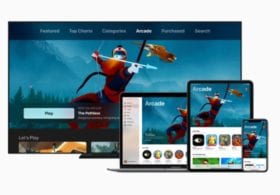By Lynn Leahey
Launched in 1994 as the Independent Film Channel, IFC has evolved since 2010 into a comedy destination that’s home to quirky favorites like Portlandia (returning for season six on January 21) and Maron (back later this year for season four). Jennifer Caserta, President & General Manager of the “Always on, slightly off” network, explains why IFC has become a draw for comedy creators and fans alike.
How would you define IFC’s brand of comedy? 
When I first started we weren’t a comedy network. We didn’t have an original programming mandate. We knew that we had a strong brand, we knew that we stood for an independent and very particular point of view, but what were we going to do to build the future of the brand in what was the growing original programming space? We decided that what felt like one of the more natural progressions was to move into comedy, specifically a smart, alternative comedy space which at the time, wasn’t flourishing the way it is right now
Is the audience for comedy today different than it was 10 years ago?
Just like television, just like content, there’s just so much of it that it’s easier to create these buckets of sub-genres. The exploration of the genre of a comedic tone, of who and what rises to the top in terms of funny, has become as diverse as much of the content that we’re all exposed to today. It’s probably more accessible than it has been in the past, and people who aren’t necessarily famous for being on television or doing stand-up can be comedic and funny. But I think the audience has also evolved and their tastes have changed as well.
For IFC, what we’ve found success with is speaking to an audience that has a very discerning taste for what makes them laugh. That’s why we like to hang our hat on accessible, funny content that is just a bit smarter than what you might normally expect. You don’t have to do a lot of heavy lifting, but the audience is more in touch with what is happening in the world – trends, cultural conversation, social media, politics. Because they have appreciation for those things, they can appreciate comedy that pokes fun of those things.
How much of that is generational, and how much is a sensibility?
A little bit of both. Younger people are more sophisticated today, and they have a depth and a breadth and an appreciation that allows them to have a knowledge that makes them respect the kind of comedic tone that I’m talking about. The “slightly off” of it all has become, ironically, more and more popular. People don’t want to conform and be mainstream. Everybody wants to celebrate individuality. It’s cool to be multi-faceted and have diverse interests
How have videos on YouTube etc. affected the audience’s expectations when it comes to humor?
People have become accustomed to quality not necessarily being the specific driver, but with what makes something funny. It’s more about the tone and the delivery. You can be exposed to many aspects of talent, meaning you could see a sketch comedy troupe experiment with some concepts on the Internet, you have people who actually have created a comedic world and environment much like a TV show online, you have people who can broadcast their standup and make it live outside of a dark comedy club on YouTube. It gives us more exposure to the vast amount of talent that’s out there.
How do you build comedy stars into financially viable franchises?

Portlandia’s Brownstein and Armisen (photo: Augusta Quirk)
Many of the people we do business with have created their own comedy franchises. Not only is it about doing standup, going on the road and touring, selling merchandise – there is a whole other level of sophistication from a business point of view, everything from book franchises to podcasting. Comedy Bang Bang in and of itself is a comedy brand. Then you see people like [Portlandia’s] Fred Armisen or Carrie Brownstein who are incredibly diverse with their talents, and are able to parlay what they do into multiple jobs and wear many hats.
How does that help IFC?
It’s an accrued value, a benefit beyond ratings and revenue. We’re dealing with people who are true notables in the field. It only adds to the value and perception of IFC and our position in the comedy space.
What I love is seeing comedians who enjoy being spokespeople. You see them in commercials, and brands and advertisers are embracing the fun side of their brand and their business, and welcoming comedians into their creative.
What are the advantages to comedy on cable?
While I think everyone has become a bit more permissive in how far they take things, I still believe that cable is an environment where we aren’t too quick to conform to the masses, so we could be probably a little bit more risk-takers, and not be so confined by definitions and limits. It is comedy after all – usually even in the most kind-spirited way, somebody’s getting a bit insulted and jabbed, and cable provides that kind of environment. At a network like ours, the brand is so important – our brand stands for a particular sensibility, slightly off comedy, and that only enhances the experience you think you’re going to find when you tune in to a show.

Comedy Bang! Bang! (photo: Greg Gayne)
Will IFC delve more into standup?
We have been and will continue to focus on scripted, everything from narrative stories like Maron to sketch like Comedy Bang! Bang! or Portlandia. We would like to explore other comedy formats but standup might not make it onto the list – it might be more of a panel show with a number of comedians who improvise or play games, or our version of a talk show or a game show.
How do you attract top tier talent?
You have to be proven. We’re at this for five years, and in that time we’ve worked on projects and with talent who have had good experiences. And word travels quickly in this circle of people. They are tight-knit, they all know each other. It’s really the situation where your reputation is on the line. How you treat people and their projects is wildly important. We also have found ourselves working with what we like to call multi-hyphenates, people who are creators/performers/executive producers/directors/writers. And when you’re so passionate about a project, you’re very careful about where you bring it. We have been very fortunate to work with the very best in the business and the caliber of talent we attract keeps getting better and better. When you have Helen Mirren hosting a show co-written by Seth Meyers, starring Bill Hader and Fred Armisen, you have to believe you are doing something right.
Do you give artists more freedom than they might find elsewhere?
I think so. It doesn’t mean it’s one big creative playground where there’s absolutely no discipline, but you set the tone for an experience that’s respectful, and we’re careful about being very transparent through the process. You might not always agree, and there might be times where the network’s point of view outweighs the creator’s and vice versa, but it’s about when you give in and what’s important, and having respect for each other and the process. We don’t treat every project exactly the same or are very regimented about how we like to give notes and get our dirty little paws all over everything. It’s quite collaborative, which makes for a positive experience.
Comedy is so much more subjective than drama. What kind of filter do you apply to your brand?
We think we are smart in our approach, and unique in our approach. One of the things our programmers at the network look for when speaking to creators and developing projects is a unique take on something familiar. So the construct of a show and why you watch a show, whether it’s a workplace comedy, a comedy of relationships or family-based comedy – what’ the “slightly off” quality about it? The skeleton can be something familiar, but when you get inside of it, there’s something a little twisted.
The Cynsiders column is a platform for industry leaders to reach out to colleagues, followers, and the public at large. In their own words and in targeted Q&As, columnists address breaking news, issues of the day, and the larger changes going on in the ever-evolving world of television, video and digital. Cynsiders columns live on Cynopsis’ main page and are promoted across all daily newsletters. We welcome readers’ comments, queries, and column ideas at [email protected].






